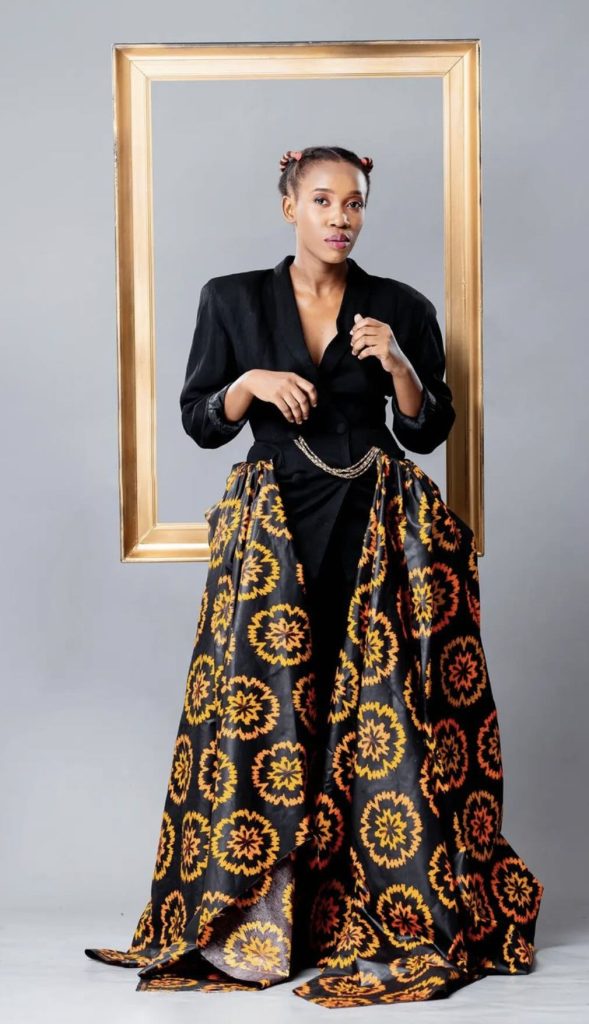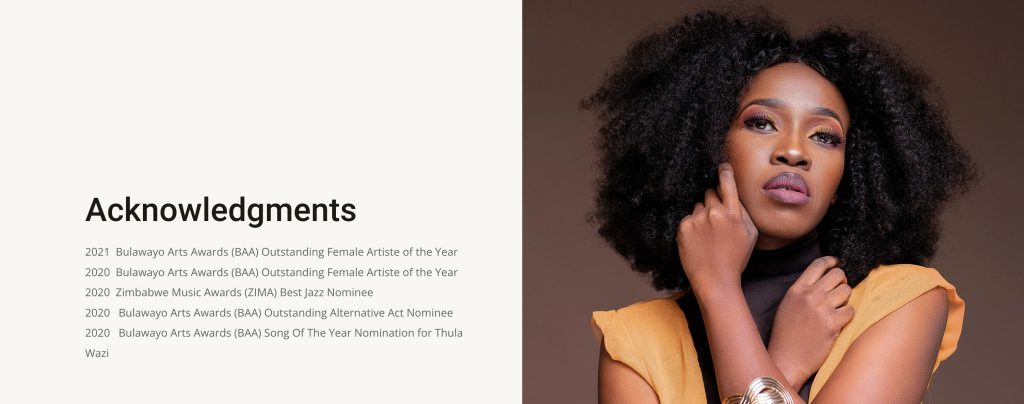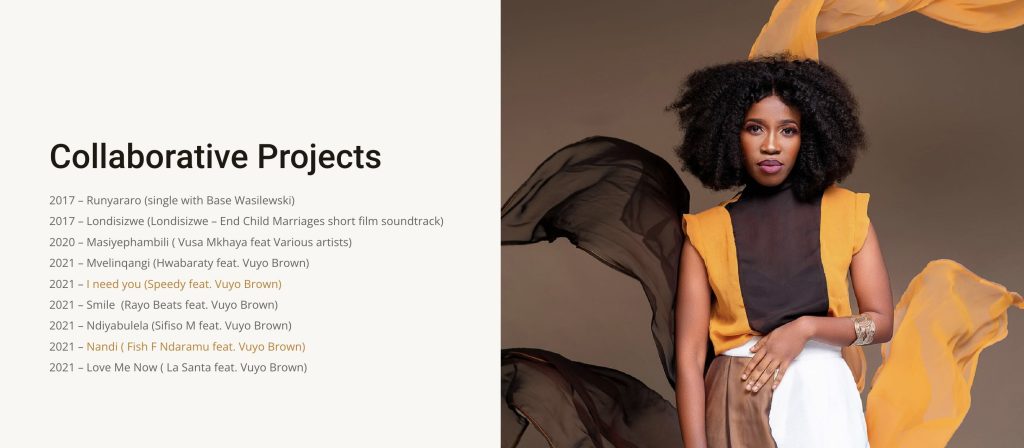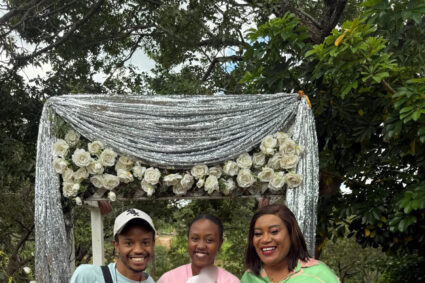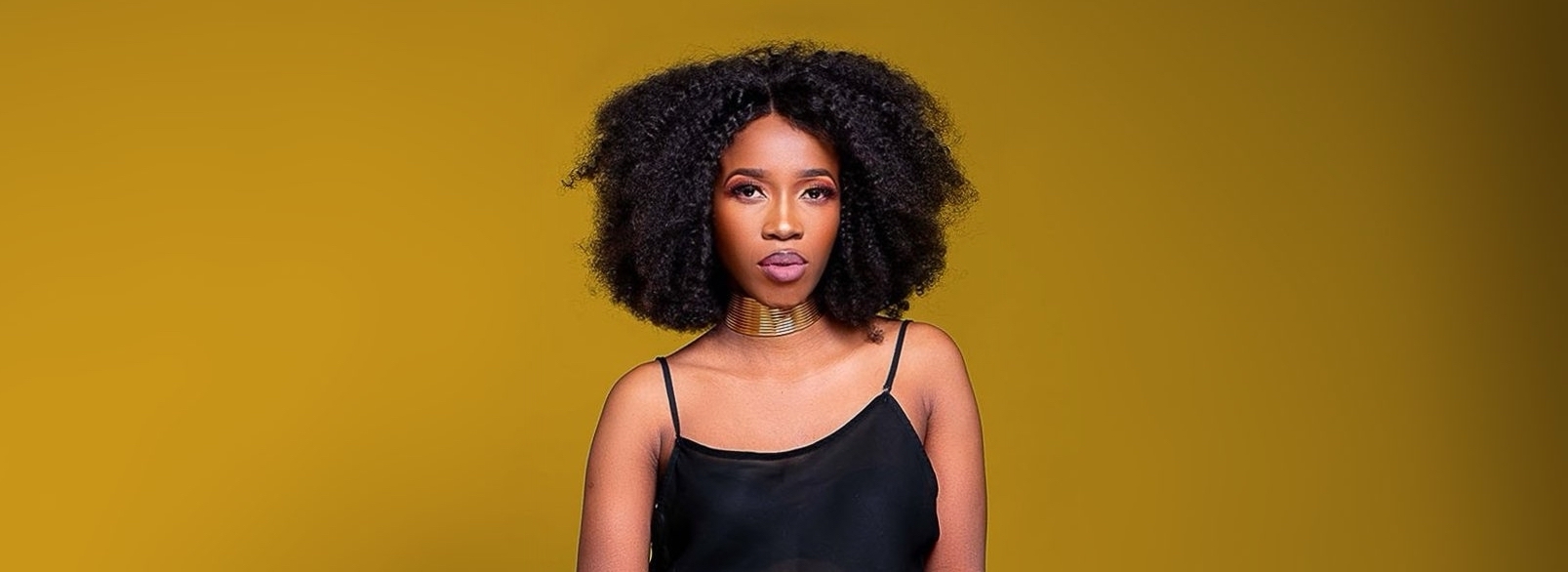
In this special feature, we look into the life music journey of a Zimbabwean singer, songwriter, and contemporary Christian musician. Her story begins in the creative city of Zimbabwe, Bulawayo, best known as the city of Kings and Queens. Her childhood, as early as 9 years, was filled with experiments, trying out different instruments as she nurtured herself in the passion for music.
In our exclusive story, Vuyo describes the many elements of life that led to this stage of her life, from being confused as South African, to gracing the many performance stages and still developing her brand.
‘Vuyo is passionate about contributing to the creative and cultural industries she is a part of. She has served as a mentor for 2 years on the “Voice 2 Rep” competition which seeks to find and nurture upcoming talent in the country.’
Below is the interview with My Afrika Magazine, Nic Abote (NA) with Vuyo Brown (VB).
NA: Thank you Vuyo for giving us this opportunity to share your story. Firstly, let’s talk about how you first discovered your passion for music, and what inspired you to become a musician?
VB: It fascinated, enticed, enchanted, drew me in from as early as (the earliest I can remember, and my memory is terrible by the way) around 5 years old.
My mother was a teacher at an Anglican missionary school at the time. The students would have music or theatrical performances on some weekends. Ah I loved those. I would perform and sing whatever I would have seen the rest of the following week. I also loved the church services, well, the musical segments. The students singing hymns plus percussion were the reason I’d be attending anyway.
I remember at 9 years old I decided “this is for me.” We were living with my dad in Harare at the time. An uncle of mine was teaching me to play instruments and the music discipline in general and it was so easy for me. I remember my excitement when I discovered my school music teacher (Blakiston Primary School) lived at my uncle’s house. It was that year that I knew. I knew.
Into high school musical programmes. I became a Christian at 14 and that same year joined the music team. My love for it just kept growing till I knew God backed it, that’s the only way I was going to.
NA: Life is that amazing and interesting, our early ‘experiments’ shape who we are now. Can you tell us about your musical journey, including any pivotal moments or influences that shaped your career?
VB: I went professional in 2014 and released my first single in 2016. My mom passed away in 2016, I had my epiphany at her funeral. It had been time for a while, and I was scared you know. No one Around me, in Bulawayo was doing what I wanted to do, had the sound I wanted to do/have, and I was feeling “who am I to then do it” lol. At my mom’s funeral I got over it, I had an epiphany. She passed on in January, in February I got into the studio. 2016 April to July I released my first single and music video. It was a Shona song, mbira brass Zimbabwean sound which was the opposite of anything those who knee expected (soul, R&B, Hip Hop were my loves then, still are) …the first part of it I wrote WITH my mom (I had started working on it in 2015); my first single is the most significant pivotal moment for me.
I just have always had a thing for things outside my experience, my reality, they fascinate me, I’m drawn to them which as I grew, I realised is what my music is and does, it introduces the listener to a reality outside their own even as a Christian. The Holy Spirit taught me to scat, amongst other things, So in 2018 I found myself understanding Jazz music, it had never been something I’d ever considered. I wasn’t planning to do it either, I just started implementing the skill in my music.
NA: Wow, may your mom continue to rest well, & she would have been very proud of the amazing lady you have become. Can you describe your music in your own words. How would you define your unique style or sound?
VB: It’s a fusion of genres honestly. 50% of me hates that there are genres, I’ll admit. This then means that my sound must be termed and defined, and I don’t care for that, I just want people to experience it. For the sake of terms, I am working on a definition. So far, it’s alright falling under “Alternative.”
NA: I guess that why you did No Way ft. JustPercy right, lol. What is the story behind your latest song, Vuyani? What message are you trying to convey?
VB: Vuyani is a colourful song. It’s soul and dance fused. I am basically saying “I am happy, come rejoice with me! See what the Lord has done.”
NA: What challenges have you faced in your music career, and how have you overcome them?
VS: The typical usual challenges of an independent artist; doing almost everything yourself, projects being self-funded, so consistency is a huge battle, trying to balance admin and creative. I am equipped in various things from media to basic office administration, so this helps a whole bunch in the things I must do for myself. I’m constantly learning and signing up for programmes, workshops etc., too, I love learning!
NA: Well done for learning, I must say, you would fool me for a model too, the personal branding is on point! Are there any collaborations or artists you dream of working with in the future?
VB: I’d love to do something with Lauren Daigle, Mali Music, King Her, Hle, there’s a quite a few artists, these I just named off the top of my head.
NA: How do you feel your music has evolved over the years, and what have been some of the driving forces behind that evolution? How accepted is it in Zimbabwe?
VB: My music is still basically the same as when I started. I haven’t professionally done it long enough to effectively answer that question. The way I do it also hasn’t caught on or been recognised yet or enough for me to shift just yet, till then, I am here. Maybe I have grown in my approach or writing, growth is inevitable, but the sound is still pretty much the same. I hope this makes sense.
In Zimbabwe, I do know, there are some songs of mine that catch on to the masses and some that are more for a niche. I do know there are some in my Christian community who struggle with it in Zimbabwe, doing Christian music the way I do is not popular yet. In Zimbabwe there’s a sound associated with “gospel music” but that’s okay, new takes time.
NA: You are a Queen, we are recognising and celebrating you now, receive it! Can you share a memorable or unique experience from one of your live performances?
VB: Off the top of my head, because it was recent: It’ll be when I was at the Jacaranda Music festival, and we saw people coming down from up on the stands and seats to get closer to watch. And I didn’t imagine it because later some of them walked up to me and confirmed it; they thought I was a South African artist, lol.
NA: Lol, well, you do present yourself that well, easy for one to think you are South African. So, music often carries deep emotional and social messages. Are there any specific issues or emotions you aim to address through your music?
VB: The two main aims of my music are to heal and to introduce the listener to a reality outside their own.
NA: That’s deep right there, keep singing then! And how has your cultural background or personal experiences influenced your music and lyrics?
VB: I was born in Bulawayo. I lived in so many parts of Bulawayo, Harare, Masvingo. This is something I appreciated as I grew up; I got exposed to so many different spaces, experiences, and people. We stayed with my mother at an Anglican missionary school she once taught at, and the students would have music or theatrical performances on some weekends. Ah I loved those. I would perform and sing whatever I would have seen the rest of the following week. I also loved the church services, well, the musical segments. The students singing hymns plus percussion were the reason I’d be attending anyway.
When I write about different life experiences, most times they’re not my own, I understand people’s pain. I also stand in the gap between Hod and His people, I write from this place too. Thula Wazi, for example, is what God was saying to people when I prayed wanting to encourage people. Mayeh, for example, is a song from the perspective of someone wanting to go back home after having realised they lost their first commitment and home is where they want to be; it can apply to a child and parent relationship, a marriage, one’s relationship with God etc.
NA: What a journey this has been hey. What advice would you give to aspiring musicians who are just starting their own musical journey?
VB: 1. Do this only if you Know, KNOW, this is what you first off, are supposed to do, second, WANT to do. If this is the place or one of the places you feel most useful and most happy, pursue it. 2. Include God in your life. He’s cool and wants to be involved.
NA: Are there any upcoming projects or tours that your fans can look forward to?
VB: Please be on the lookout on @TheVuyoBrown across social platforms.
NA: Loving all you are doing, and can’t wait to see more from you. What does the future hold for you as a musician, and what are your long-term goals and aspirations?
VB: So, this I don’t publicly share, it counts as my private life.
Experience more of Vuyo Brown’s music and future project here.
